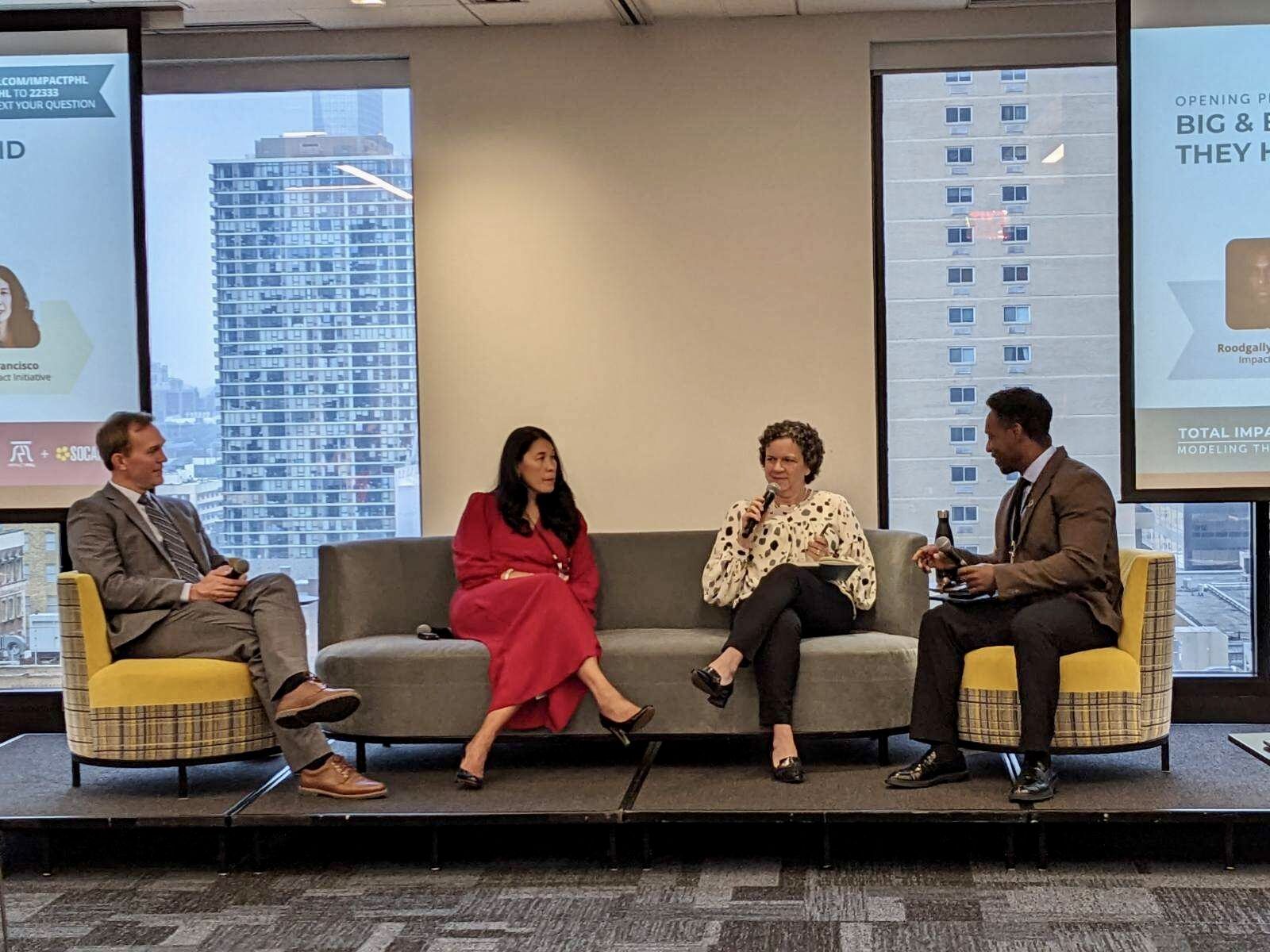TGIF, Agents of Impact! And a special happy birthday to ImpactAlpha’s own agent of impact, Zuleyma Bebell.
Small tech’s big impact. If you’re troubled by the emergence of global tech powers that control both data and access, check out a more promising trend. The innovation being unleashed by small, growing ventures is solving real problems, creating jobs and building markets. These locally rooted enterprises are putting tech to work for social and environmental impact, starting with the challenges around them. Jumpstarting the economy in South Africa (see No. 1, below). Providing affordable insurance in India (No. 6). And building new, sustainable economies in Appalachia and coal country (No. 2). As this week’s agent of impact, Banglasheshi investor Sonia Bashir Kabir, reminds us, local problems require local solutions (No. 5).
That’s why “the missing middle” in business financing is a relic to be dispatched. Many of these promising ventures have long been too big for microfinance, too small for private equity, too staid for venture capital, too risky for banks. Sounds like an opportunity for Agents of Impact around the globe. Cities are mobilizing to cultivate and attract social entrepreneurs (No. 7). Accelerators are connecting local entrepreneurs with mentors and support networks (No. 3). New investment funds are closing capital gaps and fueling growth (Nos. 1, 4 and 5). And by making it easier to spot winning strategies, practitioners and researchers are bringing capital off the sidelines (Nos. 8 and 9). It may be small biz, and small tech, that delivers the biggest impacts.
– Amy Cortese, guest editor
Featured: ImpactAlpha’s Big 10
1. On the frontiers of impact tech. Reversing climate change while ensuring that people thrive is the 21st century’s biggest challenge. Tech breakthroughs like lab-grown protein, mobile credit and insurance, and genome editing for vaccines will be key. “The speed and scale of the transformation we need… has no historical precedent,” write Manuella Cunha Brito, Ludovic Sinet and Benjamin Tincq of Good Tech Lab, a Paris-based research firm. “Science, technology, and system entrepreneurship could be our wildcards.” Good Tech Lab’s timely report last week, “The Frontiers of Impact Tech,” mapped 180 trends and 500 projects delivering against the 2030 Sustainable Development Goals with the intentional use of science and technology, and provided valuable context for a raft of “impact tech” deals and signals. More.
- New funds. San Francisco venture capital firm Fifty Years raised a $50 million Fund II to back tech entrepreneurs tackling the world’s weightiest problems. “The climate crisis. Disease. Malnutrition. These are what the best and brightest should be focusing on solving,” Fifty Years’ Seth Bannon told ImpactAlpha. “This is where capital should be flowing.” More.
- New ventures. Austin-based Techstars Impact launched its latest cohort of enterprises using technology to tackle animal and human health, fairer data and good jobs. The group of 10 included Baltimore-based R3 Score, which is giving Americans with a criminal record a fairer shake when applying for jobs and financial services, and Accra-based Cowtribe, which helps small-scale livestock farmers in Africa coordinate animal care.
- New products. Among 2019’s top “fintech” trends from CB Insights: Growing demand for ESG and impact investing financial-tech products, like online banks Aspiration and Newday, investing platforms such as Motif, OpenInvest and Swell, and innovative lending products like CNote. More.
- Overlooked geographies. South African startups like SweepSouth, which matches un- and under-employed domestic workers with professional cleaning gigs, aren’t waiting around for policymakers or big businesses to fix the country’s economic woes. A new ImpactAlpha series with University of Cape Town’s Bertha Centre for Social Innovation and Entrepreneurship and Investec highlights bright spots in South Africa’s emerging impact-tech scene. More.
2. Appalachian communities are planting seeds for a future without coal. The signals that the world is moving beyond coal are clear, and in the U.S., they’re market-led. Less certain is the future of communities that have long depended on the coal industry for jobs and economic activity. In the first of a two-part series, ImpactAlpha takes an in-depth look at the public and private coalitions in coal-dependent Appalachia laying the groundwork for a more economically diverse and sustainable future. Advocates are testing projects, like solar-powered aquaponics farms, to stock a pipeline of initiatives ripe for funding if and when Congress passes the $1 billion RECLAIM Act for post-coal communities. “We want to queue up these projects to show that there are options, to show that there are other economic development ideas out there,” said Joey James at West Virginia-based Downstream Strategies. Also on the horizon: Invest Appalachia, which is pooling tens of millions from place-based investors to support new businesses and sectors. Mining the future.
3. Data supports the role of business accelerators in global development. Y Combinator ignited a trend a decade ago. Business accelerator programs have since proliferated across geographies and sectors, and are increasingly viewed as a key component of economic development in emerging markets. New data suggests they are indeed adding value. A study by the Global Accelerator Learning Initiative found that, on average, $1 in program costs leads to $1.70 in increased short-term funding for participating entrepreneurs in the form of revenue, equity investment, debt, and philanthropic funding. The caveat: these benefits vary wildly across programs. In a guest post on ImpactAlpha, ANDE’s Matthew Guttentag and University of Oregon’s Saurabh Lall (Lall co-authored a recent book on the study) share insights on what sets some programs apart. Indonesia’s Instellar, for example, is leveraging the power of networks by emphasizing one-on-one work with mentors and network development. Get the scoop.
4. Setting ‘small and growing business’ investing on a path to exponential growth. Nearly every economy in the world touts the importance of small businesses in driving growth and jobs. Still, massive gaps in funding limit their potential. A new report from the Aspen Network of Development Entrepreneurs, whose members support small and growing businesses (SBGs) in emerging markets, indicates an uptick in investment funds focused on the sector (56 new vehicles raising $1.2 billion). “We see lots of favorable trends… but sector growth remains linear,” ANDE’s Randall Kempner told ImpactAlpha. Kempner says the sector has yet to reach “the exponential growth we’d need to see to unlock the full prosperity-creation power of SGBs in emerging markets.” One obstacle: Overcoming risk perceptions. “More data and experimentation are needed in order to better understand the relative risk of these businesses, and therefore the commensurate return requirements,” Drew von Glahn of the Collaborative for Frontier Finance told ImpactAlpha. More.
5. Agent of Impact: Sonia Bashir Kabir of SBK Tech Ventures. As Microsoft’s managing director for Bangladesh and other countries in South Asia, Sonia Bashir Kabir was building tech solutions for the world’s top three billion or so income earners. Now, with SBK Tech Ventures, the Bangladeshi tech investor and entrepreneur is turning her attention to the challenges of the next four billion. Kabir left Microsoft in May to launch SBK, an “impact tech” fund with a focus on tech-enabled ventures solving financial, legal, agricultural and other challenges facing rural consumers in Bangladesh, Myanmar, Nepal, Sri Lanka and countries in Southeast Asia. Kabir burnished her chops in “impact tech” by co-founding or investing in more than two-dozen Bangladesh startups, including solar mini-grid startup SOLshare, rural e-commerce venture Deligram and family-health center network Praava Health.
“I’ve seen these problems first hand,” says Kabir, who grew up in Bangladesh before moving to Silicon Valley for her education. She’s worked with Sun Microsystems, Syntec and Dell, is vice chair of the U.N. Technology Bank for Least Developed Countries, chairs an angel investor network in Bangladesh and—ready for this?—played volleyball and cricket for Bangladesh’s national teams. In keeping with SBK’s ecosystem approach, Kabir has opened tech hubs in 64 different districts in Bangladesh to support her portfolio companies and familiarize rural Bangladeshis with new technologies. Kabir says few companies are tackling the big challenges facing the hundreds of millions of tech-connected consumers emerging from poverty in South Asia. The solutions, she believes, will be home grown. “What works in the west may not work in the east,” she says. “We’re next.” Follow ImpactAlpha on Instagram.
- Follow the talent with ImpactAlpha’s weekly report on career moves, job openings, events and opportunities.
6. Deals of the week. Stay on top of the dealflow all week long on ImpactAlpha.com. A few that stood out:
- Institutional shift. CalSTRS commits $750 million to three sustainable investment fund managers.
- Returns on inclusion. 54gene raises $4.5 million to increase African genetic material in medical research. NiYO raises $35 million to bank India’s blue collar workers… Lok Capital backs India insurance startup RenewBuy… Rent To Own secures €1 million for equipment financing in Zambia.
- Clean energy. Oxford PV closes £65 million round to commercialize ultra-efficient solar tech… Bridges acquires Maven Capital’s stake in wind energy company GEV.
- Future of food. AeroFarm raises $100 million to grow vertical farms.
- Innovative finance. Bridges raises £35 million for second pay-for-success fund.
7. Building more inclusive cities. Boston, San Francisco, Washington and New York have the best ecosystems in the U.S. for top social entrepreneurs, according to a ranking by the Halcyon Incubator, which drew on a survey of more than 400 social entrepreneurs, interviews with experts, and public data. Also on the list: Minneapolis and Raleigh, Pittsburgh and New Orleans, Detroit and Baltimore, Atlanta (h/t Mark Crosswell), Philadelphia, Phoenix, Austin and more. A hurdle for even the top performing cities: building social entrepreneurship ecosystems that meet the needs of underrepresented and underestimated founders (see, “Building local startup ecosystems that work for entrepreneurs of color”). More on how.
8. Assessing the expected impact of investments. Investors seeking an edge through impact investing’s ability to deliver alpha returns, risk mitigation or better outcomes may want to bone up on emerging best practices in ‘impact due diligence.’ Understanding how to assess the expected impact of an investment before it’s made got a little easier this week with, “Impact Due Diligence: Emerging Best Practices,” a new report from Oakland-based Pacific Community Ventures. The practice is underdeveloped, says PCV’s Daniel Brett, yet “systematically examining which investments are expected to generate more or less impact can help investors more closely align their investments with their objectives.” Get smarter.
9. A continuum for impact. ImpactAlpha’s “Beyond Tradeoffs” podcast series with Omidyar Network drew attention to impact investment strategies across the continuum of financial returns. The Impact Management Project has been building a continuum for impact it calls “impact classes.” Much like financial asset classes, impact classes provide a shorthand for conveying the impact characteristics of an investment in a descriptive manner. By bringing these two pieces together, writes IMP’s Mike McCreless in a guest post on ImpactAlpha, “we can build a more complete understanding of investments’ performance.” A common language.
10. Summer listening: Seven ImpactAlpha podcasts to keep your vacation brain in shape. ImpactAlpha’s Returns on Investment has recorded nearly 100 episodes. In the first half of 2019, roundtable regulars Imogen Rose-Smith of the University of California, Liquidnet’s Brian Walsh and ImpactAlpha’s David Bank took on bottom-up (and top down) alternatives to exclusionary politics, ESG’s real-world impact, billionaire media vanity projects, optimizing the New Green Deal and impact’s Varsity Blues scandal, among other topics. Soak it up.
- Don’t miss an episode! Subscribe to ImpactAlpha’s Returns on Investment podcast at iTunes, Spotify, SoundCloud or Stitcher.
— July 12, 2019.











